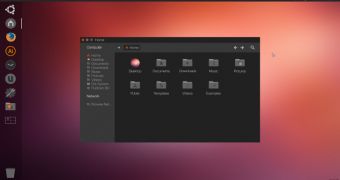Canonical is preparing to launch Ubuntu 14.04 LTS (Trusty Tahr) in just a couple of days, but the Ubuntu developers are already starting to reveal what major changes will be implemented in Ubuntu 14.10.
Canonical has been talking about the convergence of the platforms for quite some time, and the next Ubuntu 14.10 might just be the first version to actually get close to it. When Ubuntu developers talk about convergence, they think about a single operating system built for PCs and mobile platforms, with a single set of applications and a single vision that spans across platforms.
To make this convergence happen, the developers must consider some very important modifications to the desktop version of Ubuntu. The mobile platform is already working towards this goal and the desktop must catch up to it. This means that a number of packages will have to be replaced.
“With 14.04 wrapping up it's time to start thinking about what we can do with the desktop post LTS. I think there's one big theme we need to focus on - Convergence. All the Unity 8 goodness that is going into the phone / tablet builds is coming our way and we need to be prepared for that migration,” noted Canonical's Robert Ancell.
The convergence plan will take some time and it will not be achievable overnight. Some intermediary steps need to be taken and it seems that Ubuntu 14.10 will be a playground for some of the major changes planned.
For example, gnome-session will be deprecated and upstart/systemd will be the root process, and screensaver management will be implemented into the shell, which means that gnome-screensaver needs to go away.
“We forked gnome-settings-daemon so we could stick with the version we have currently. Now we should start pulling out the plugins and migrating to the new services (e.g. power). Any remaining services need to be rehomed / made into standalone services. By convergence there should not be u-s-d anymore,” also said Robert Ancell.
The Ubuntu developer also explained that Ubuntu System Settings (the utility that is currently being used on the mobile platform) must be made to work on the desktop and it should eventually replace Unity Control Center.
Also, some of the core apps developed on the mobile platform will have to work on the desktop as well. This means that soon, maybe even in Ubuntu 14.10, we might get a new File manager that will replace Nautilus (Files).
These are just a few of the propositions made and the list of changes is open for discussion. If only half of these propositions are implemented, Ubuntu 14.10 might turn out to be one of the most interesting releases in quite a while.

 14 DAY TRIAL //
14 DAY TRIAL //